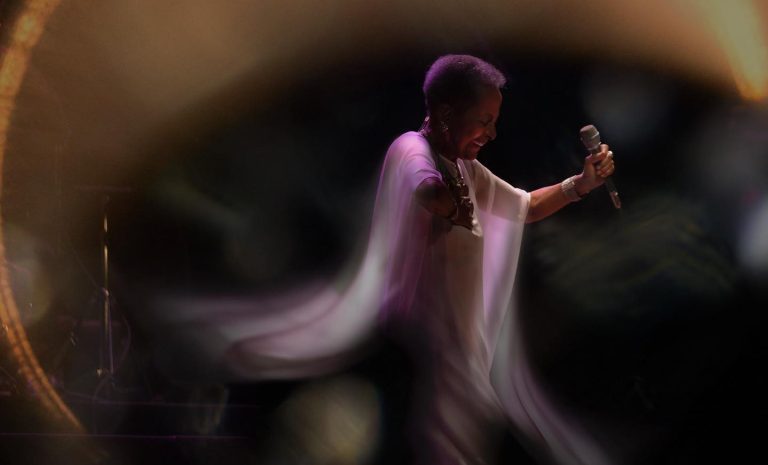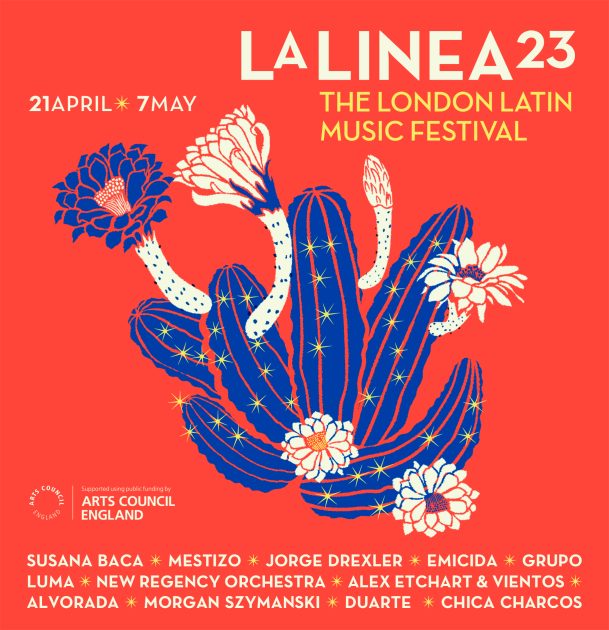
“Creating spaces for political songs in any music genre is vital. Even reggaeton” – An Interview with Susana Baca
25 February, 2023Susana Baca is not indifferent to the social and political crisis in Peru. Indifference has never been her thing. Since she took up art as a way of life, the Afro-Peruvian singer and multi-Grammy award winner has always had a clear and powerful discourse against the structural problems of her native country: inequality, discrimination, and racism. Whether as a Minister of Culture, as a citizen, or as an artist. In addition to spreading her opinion against the repression of the current president Dina Boluarte, Susana continues to make music. We spoke with her during a brief pause from rehearsals for a tour that will bring her to London, where she will participate in La Linea Festival 2023. Every spring, this event presents an extraordinary mix of international stars and emerging talent from the Latin American music scene. Susana – who headlines this festival along with Jorge Drexler, Mestizo, and Emicida – revealed that she is about to release a new album in tribute to Chabuca Granda, the iconic Peruvian composer. It’s a production of enormous significance for her, which features great guests such as Omara Portuondo.
Chabuca Granda and the new album
FAO: “Does this new album have a name yet?”
SB: “No, not yet. Because Chabuca Granda has so many lyrics and compositions, it is hard for me to name this tribute album. However, I have already finished the recording phase with Ricardo Pereira, who produces all my works. We only had to record the guest artists.”
FAO: “There are guests then?”
SB: “Well, there is a marvelous guest artist: Omara Portuondo. The other guests are less known, but they’ve put their souls into it. You will soon hear this release. It is a beautiful album.”
FAO: “Did you personally select the songs you recorded for this tribute album?”
SB: “Yes, I have interpreted a lot of Chabuca’s repertoire. The murder of the poet Javier Heraud in the 1960s moved her very much – so she paid tribute to him with songs. On this album, I will sing a lot about Javier Heraud.”
FAO: “There’s a celebrated anecdote about you and Chabuca Granda. When you began your musical career, she advised you to ‘look for other people’s songs because they won’t listen to you much if you sing only mine.'”
SB: “It was 1963. When we met, Chabuca asked me if I wanted to devote myself to singing – I said yes, I wanted to do it even though some songs at the time I didn’t like. ‘I sing poetry. That’s why I do a repertoire with your songs,’ I told her. Chabuca replied: ‘If you sing my compositions, they won’t listen to you.’ That’s what she told me, with all the sadness that phrase has. Nowadays, everybody talks about Chabuca, but that was not so much the case when she was alive.”
FAO: “What is the release date for the new album?”
SB: “Hopefully, it will be next March 8, but we are still in the mixing stage. Otherwise, it will have to be in September when we celebrate Chabuca’s birthday.”
FAO: “You have been very active with record releases: last year, you released Epifanías (2022), and before that, you gave us Palabras Urgentes (2021) and A Capella (2020). It is one album per year at 78 years old.”
SB: “And I still have work saved on the computer, which is practically ready. For example, I participated in a special tribute to three crucial women of Peruvian music: Alicia Maguiña, Chabuca Granda, and Victoria Santa Cruz. It is a documentary and a video concert entitled Confidencias, where I talk with a person very dear to the three of them: the architect Javier Luna. We will broadcast it soon.
“Also pending is a tribute album to the Señor de los Milagros that I recorded with a lovely African choir. I recorded it in Nigeria, and now it is in the hands of producer Ricardo Pereira. We only need to add the choral voices from a group of young people from Cañete, who accompany me in my concerts.”
Close to the music
FAO: “Here I have to ask you: where do you find the time and strength to keep yourself active in music?”
SB: “Oh, I don’t know, I don’t know. I only ask God to give me health to continue delivering what we produce.”
FAO: “When you look back, do you feel satisfied with your musical work, or do you think you still have a long way to go?”
SB: “Well, I always keep dreaming. I have a job to do with the young people of my country. Many young people follow me, and I want to share with them. I will continue to do so, little by little.”
FAO: “The new generations have approached you from your collaborations with artists trending in the music scene. One of them was Residente from Calle 13, with whom you recorded the hit single ‘Latinoamérica.’ He is a reference to the so-called urban music.”
SB: “Yes, he is. Here in Peru, I also share with many young artists linked to this musical genre characterized by its recited verses. I just collaborated with Lobo Gris, who has a very political discourse. There is also a group of musicians who, in their new song [Artistas por la Memoria with the single ‘Presentes’], recite and sing about the current crisis in the country.”
FAO: “Do you feel close to urban music and hip-hop?”
SB: “Of course, I do. For me, what’s important is that young people are aware of their reality – in my time, I did it too. I did it when I was young, and I do it now that I am old. Creating spaces for political songs in any music genre is vital. Even reggaeton.”
FAO: “Although, many people look down on these musical genres.”
SB: “Yes, because some artists sing horrible things and say ugly things, but others sing about crucial issues. They are reciting their reality.”
The social role of artists
FAO: “Is it possible for an artist to be apolitical?”
SB: “I will talk about myself: I believe an artist cannot remain on the sidelines. Now, there is also the freedom of individuals. Other artists act according to their thoughts – we should not force them to speak out. That depends on each person.”
FAO: “Because there is also the other position: is it possible to sing or make art in a country where people die daily?”
SB: “Art must continue to express what one feels in the face of injustice. I could not bear to see the murder of so many young people and compatriots. That is why I spoke out clearly. I believe in my statement.
“Our country is very racist and has not yet overcome mental colonialism. As Peruvians and Latin Americans, we must embrace the cultural changes that have taken place. However, today I still hear expressions I used to hear when I was young: ‘Why did those indigenous people come to Lima?’ or ‘They have ruined Lima.’ And this capital city walks thanks to the work and culture of the people who migrated from the provinces.”
FAO: “This structural racism has led to the oblivion of art and culture outside the Lima circuit.”
SB: “It is true. For example, to listen to our music, the music of the Peruvian highlands, we have to wake up at 5 am, since that is the hour when it has space on the radio stations. ‘It’s for the campesinos,’ they say.”
FAO: “You were the Minister of Culture in Peru. In this social crisis, the ministry seems not to be exercising its role as an intercultural mediator and promoter of social dialogue. Do you think this institutional voice is missing?”
SB: “Yes, of course. The current discourse is that the protesting communities have links with terrorism. That is an empty argument to justify the crimes committed. There is a Law of Prior Consultation, which is very important for intercultural dialogue and respect for the communities. This law empowers the State to meet with the leaders to discuss and resolve. However, it is not adequately applied.”
FAO: “You said you initially believed in President Dina Boluarte since she is of Andean origin.”
SB: “From Andahuaylas! I had working meetings with women from Andahuaylas when I was Minister of Culture to advise President Ollanta Humala – who never listened to me. They understood that mining is crucial for the economy because it is necessary to build schools and hospitals. Of course, without contaminating the river basins. Water is fundamental for life. The problem with the current government is that they believe they can achieve an intercultural dialogue by underestimating the people – as if they were ignorant people who know nothing. They have to sit at the table and look them in the eye, face to face.”
FAO: “But the Peruvian government continues to underestimate them. Are you surprised by the actions of President Boluarte?”
SB: “I am surprised. I have never met the president personally, and I don’t know if she has always thought that way – but she must have experienced racism. However, she no longer sees it as a social problem since she achieved a social position in Lima.”
FAO: “Do you still experience any discrimination?”
SB: “Today, I would say no. But I have experienced discrimination in previous years – I know what racism is. Nowadays, I choose to be a voice against this social issue because everyone recognizes me as Susana Baca – the artist and the award winner. If the president of the Republic has forgotten structural racism and does not know that it is a social disease we must cure, we are in deep trouble.”
About La Linea Festival

Susana Baca returns to London after many years to headline the 2023 edition of the La Linea Festival, which will take place in different venues in the city between April 21 and May 27. She will perform on the festival’s opening date (April 21) at The Jazz Cafe (5 Parkway, London, NW1 7PG) from 7 pm.
In addition to the Afro-Peruvian singer, La Linea Festival 2023 will feature seven-time Latin Grammy Award and Academy Award winner Jorge Drexler. The Uruguayan singer-songwriter will perform songs from his acclaimed 2022 album Tinta y Tiempo, marking his long-awaited return to London after a three-year absence. The concert will take place at the Barbican on May 1.
Also performing will be prominent Brazilian rapper and star of the Netflix documentary Amar Elo, Emicida, British-Colombian ensemble Mestizo, Latin jazz group The New Regency Orchestra, Brazilian quintet Alvorada, Mexican virtuoso guitarist Morgan Szymanski, among other great artists from the Latin American music scene. Tickets are on sale now and available from www.lalineafestivalcom.
Follow Sounds and Colours: Facebook / Twitter / Instagram / Mixcloud / Soundcloud / Bandcamp
Subscribe to the Sounds and Colours Newsletter for regular updates, news and competitions bringing the best of Latin American culture direct to your Inbox.

